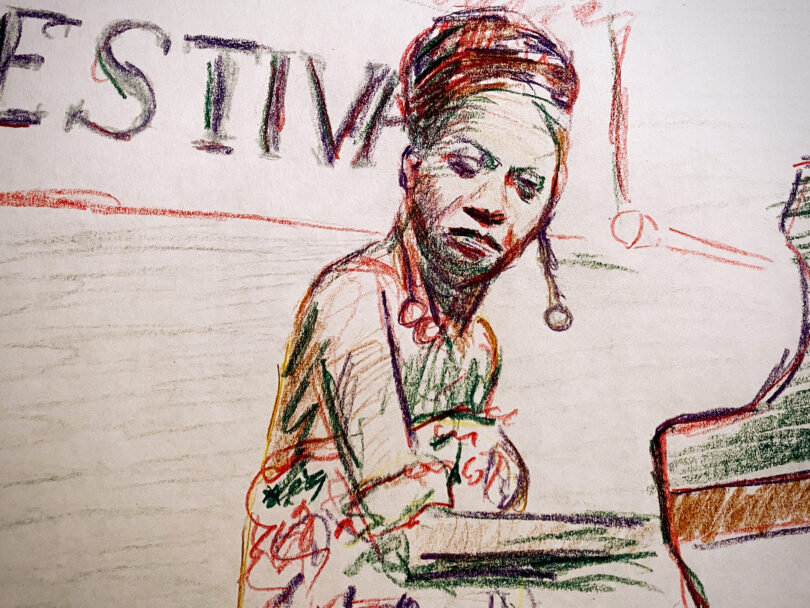I am sitting at the local hospital, having been called in to advocate for a sexual assault victim. As I wait outside the ER examining room for the detective to finish interviewing our client, I am struck once more by the healing reality that it is connection, relationship, caring, kindness and empathy — all facets of love — that make the world go around. Even in this instance, just my presence, my smile or a welcoming ear can help to break the remembrance of the pain and suffering associated with what happened — even for just a moment.
Then I remember last week’s online staff meeting. We were discussing our thoughts openly and how each of us was dealing with the aftermath of the killing of George Floyd by a Minneapolis police officer. I was witness to the profound sadness and struggle with hopelessness that my coworkers relayed. My heart ached with heaviness, cracking open wide, eyes tearing up with a palpable rawness as my friends relayed their own stories — all varied dependent upon their age, sex and experience.
For my black coworkers, it’s meant living in fear that your fiancé or father may not come home one day. Or that, as a young black male, you would experience the repeat of being personally harassed by law enforcement. It’s meant remembering the day Martin Luther King, Jr. was assassinated, when for a crushing moment, the world stopped. And now, it’s having the courage to protest for human rights, knowing that you, yourself or your child could be hurt or even killed for standing up for something so intrinsically basic.
Whether a client in need, coworker or friend, it is blatantly clear to me that the compassion and love I feel for them has nothing to do with anything lying on the surface and visible to the naked eye — not the color of their skin, the wrinkles that come with age, the outward appearance of being male or female or the knowledge of who they choose to love.
What We See … and Don’t See
I know this, because what is essential is invisible to the eye (thank you, Antoine de Saint-Exupéry and his Little Prince). This whole black/white, male/female, LBGTQ thing, I believe, really has more to do with the fundamental character of people — how we “be” in the world when no one is watching — what we deem as important and worthwhile and how we behave towards others in the pursuit of it. Why do we continue to fool ourselves? None of this is an issue of skin color, socioeconomic status or who people are drawn to love or how they feel comfortable expressing themselves. This is a battle between those who choose to live in hate and fear, acting accordingly, and those who are determined to live in love and courage. It’s a power struggle of the most epic kind — the kind we see in blockbuster movies, the kind we learn about spiritually whether through religious teachings or intimate, honest self-reflection.
Since the beginning of time, humans are humans are humans. There are people who make cruel and inhumane decisions daily — with the blink of an eye consistently choosing themselves over others and choosing to hate those who are different than themselves. These are the people — the haters and fear mongers — who are the real enemy to what’s good. Mean people come in all colors, orientations and professions — that’s the real truth of it all. Perhaps we are missing the key message as we focus on the most shallow of scapegoats, that which resides solely at the surface of an individual’s or group’s appearance.
So, maybe what we have here is a bad cop murdering a man; rioters, not peaceful protesters, burning and opportunistically looting for their own gain; the media looking for (or concocting) their next drama to exploit and sensationalize for ratings; politicians more worried about their careers than standing up for the citizens who put their faith in them; people refusing to take responsibility for their own lives while others build walls instead of reaching out. Each one of these actions is designed to separate and the reality is that we are systematically doing it to ourselves. Maybe, for one minute, we could stop pointing fingers at each other and explore deep down what part each one of us has played, if any, in fueling the turmoil, hate and civil unrest.
The reality is that there are all kinds of people who live their lives hurting, judging, blaming others and not taking responsibility for themselves. To help a little, let me name some for you — the world is full of ill-meaning doctors, parents, judges, taxi drivers, care takers, fast food workers, farmers, coaches, plumbers, clergy, car mechanics, politicians, world leaders, talk show hosts, athletes, truck drivers, armed service people and dog walkers — I could go on. Just in case you were wondering, in that inexhaustible list, nowhere does it indicate color, race, sex or orientation. Those who continue to perpetuate thoughts and actions of discrimination only serve themselves in order to feel a false sense of control, to bolster their ego or pockets and to justify irrational emotions and fear.
It’s Time to Step Up
It is imperative, for lasting positive change, that we have open discussions and vigilantly hold ourselves accountable for our own actions and why it is most important that we understand that, as humans, we all have the potential to slip into malevolence and complacency. At any moment any one of us may choose against our fellow neighbor. If we understand where hate comes from, we will be more apt to catch the signs before slipping down that slippery slope.
Benjamin Franklin once said, “Justice will not be served until those who are unaffected are as outraged as those who are.” What that plainly means is that all of it, this huge systemic issue, is collectively our problem. Full stop, there you go — bad behavior is everyone’s issue.
Recently, I was listening to a Radiolab podcast while driving. It was about the singer, Nina Simone. Her voice rising with defiance simultaneously over the sounds of protesting in the L.A. streets recorded last week, she sang Backlash Blues, a civil rights song written with the poet Langston Hughes. Powerful. After Martin Luther King, Jr.’s assassination, protests followed, riots and burning ensued. Sound familiar? In a live recording at a festival in Westchester, N.Y., only three days after King’s murder, Nina had this to say, “But he had seen the mountaintop and he knew he could not stop. Always living with the threat of death ahead. Folks you’d better stop and think. Everybody knows we’re on the brink. What will happen, now that the King of love is dead?”
I heard a tiny voice the other day. Maybe I was imagining it. It came from a guy named History. He said, “Don’t make me repeat myself.”


